Robot Dreams may refer to:
- Robot Dreams (short story collection), a 1986 collection of science fiction short stories by Isaac Asimov
- Robot Dreams (short story), a science fiction short story by Isaac Asimov
- Robot Dreams (film), a 2023 animated film
Robot Dreams may refer to:
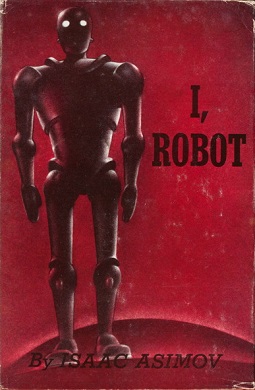
I, Robot is a fixup collection made up of science fiction short stories by American writer Isaac Asimov. The stories originally appeared in the American magazines Super Science Stories and Astounding Science Fiction between 1940 and 1950 and were then compiled into a single publication by Gnome Press in 1950, in an initial edition of 5,000 copies.
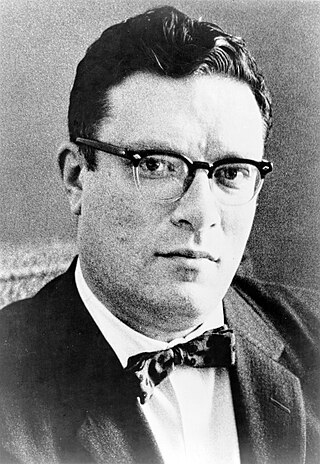
Isaac Asimov was an American writer and professor of biochemistry at Boston University. During his lifetime, Asimov was considered one of the "Big Three" science fiction writers, along with Robert A. Heinlein and Arthur C. Clarke. A prolific writer, he wrote or edited more than 500 books. He also wrote an estimated 90,000 letters and postcards. Best known for his hard science fiction, Asimov also wrote mysteries and fantasy, as well as popular science and other non-fiction.
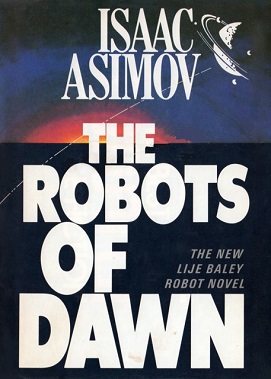
The Robot Series is a series of thirty-seven science fiction short stories and six novels created by American writer Isaac Asimov, from 1940 to 1995. The series is set in a world where sentient positronic robots serve a number of purposes in society. To ensure their loyalty, the Three Laws of Robotics are programmed into these robots, with the intent of preventing them from ever becoming a danger to humanity. Later, Asimov would merge the Robot series with his Foundation series.
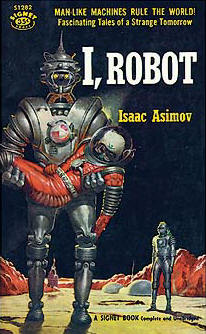
The Three Laws of Robotics are a set of rules devised by science fiction author Isaac Asimov, which were to be followed by robots in several of his stories. The rules were introduced in his 1942 short story "Runaround", although similar restrictions had been implied in earlier stories.

Gardner Raymond Dozois was an American science fiction author and editor. He was the founding editor of The Year's Best Science Fiction anthologies (1984–2018) and was editor of Asimov's Science Fiction (1986–2004), garnering multiple Hugo and Locus Awards for those works almost every year. He also won the Nebula Award for Best Short Story twice. He was inducted to the Science Fiction Hall of Fame on June 25, 2011.
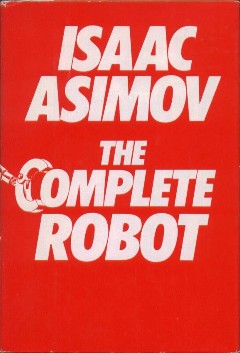
The Complete Robot (1982) is a collection of 31 of the 37 science fiction short stories about robots by American writer Isaac Asimov, written between 1939 and 1977. Most of the stories had been previously collected in the books I, Robot and The Rest of the Robots, while four had previously been uncollected and the rest had been scattered across five other anthologies. They share a theme of the interaction of humans, robots and morality, and put together tell a larger story of Asimov's fictional history of robotics. The stories are grouped into categories.
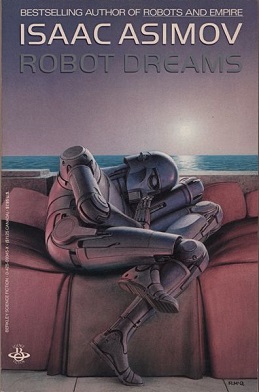
Robot Dreams (1986) is a collection of science fiction short stories by American writer Isaac Asimov, illustrated by Ralph McQuarrie. The title story is about Susan Calvin's discovery of a robot with rather disturbing dreams. It was written specifically for this volume and inspired by the McQuarrie cover illustration. All of the other stories had previously appeared in various other Asimov collections. Four of the stories are robot stories, while five are Multivac stories.
"Liar!" is a science fiction short story by American writer Isaac Asimov. It first appeared in the May 1941 issue of Astounding Science Fiction and was reprinted in the collections I, Robot (1950) and The Complete Robot (1982). It was Asimov's third published positronic robot story. Although the word "robot" was introduced to the public by Czech writer Karel Čapek in his 1920 play R.U.R., Asimov's story "Liar!" contains the first recorded use of the word "robotics" according to the Oxford English Dictionary. The events of this short story are also mentioned in the novel The Robots of Dawn written by the same author.
"Little Lost Robot" is a science fiction short story by American writer Isaac Asimov. It was first published in the March 1947 issue of Astounding Science Fiction and reprinted in the collections I, Robot (1950), The Complete Robot (1982), Robot Dreams (1986), and Robot Visions (1990).
This is a bibliography of the books written or edited by Isaac Asimov, arranged alphabetically. Asimov was a prolific author, and he engaged in many collaborations with other authors. This list may not yet be complete. The total number of books listed here is over 500. Asimov died in 1992 at age 72; a small number of his books were published posthumously.

"The Last Question" is a science fiction short story by American writer Isaac Asimov. It first appeared in the November 1956 issue of Science Fiction Quarterly and in the anthologies in the collections Nine Tomorrows (1959), The Best of Isaac Asimov (1973), Robot Dreams (1986), The Best Science Fiction of Isaac Asimov (1986), the retrospective Opus 100 (1969), and in Isaac Asimov: The Complete Stories, Vol. 1 (1990). While he also considered it one of his best works, "The Last Question" was Asimov's favorite short story of his own authorship, and is one of a loosely connected series of stories concerning a fictional computer called Multivac. Through successive generations, humanity questions Multivac on the subject of entropy.
I, Robot is a 1950 science fiction fixup novel by Isaac Asimov.

"I, Robot" is a science fiction short story by Eando Binder, part of a series about a robot named Adam Link. It was published in the January 1939 issue of Amazing Stories.
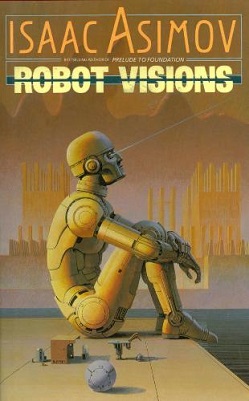
Robot Visions (1990) is a collection of science fiction short stories and factual essays by Isaac Asimov. Many of the stories are reprinted from other Asimov collections, particularly I, Robot and The Bicentennial Man and Other Stories. It also includes the title story, "Robot Visions", which combines Asimov's motifs of robots and of time travel. It is the companion book to Robot Dreams (1986).
"Robot Dreams" is a science fiction short story by American writer Isaac Asimov exploring the unbalance of robot/human relationships under Asimov's Three Laws of Robotics. It was nominated for a Hugo Award in 1987. It won the Locus Award for Best Short Story in 1987. "Robot Dreams", along with 20 other short stories by Asimov, was published in Robot Dreams in 1986 by Berkley Books.
Robots named Robert, Robbie/Robby, Rob, and the like, reflect an alliteration trope in science fiction in which robots are given names starting with the letter "r", and particularly with the phoneme "rob". Isaac Asimov noted this in-universe in the short story, "Christmas Without Rodney", in which a character says: "There's no law about it, but you've probably noticed for yourself that almost every robot has a name beginning with R. R for robot, I suppose. The usual name is Robert. There must be a million robot Roberts in the northeast corridor alone". This trope has appeared not only in the English language, but also in languages such as German and Russian. Robots named following this trope include:
"Farewell to the Master" is a science fiction short story by American writer Harry Bates. It was first published in the October 1940 issue of Astounding Science Fiction on page 58. It provided the basis of the 1951 film The Day the Earth Stood Still and its 2008 remake. In 1973, the story was adapted by Marvel Comics for its Worlds Unknown series. According to Gizmodo, the 1973 adaptation was more faithful to the original story than was the 1951 film.
In a writing career spanning 53 years (1939–1992), science fiction and popular science author Isaac Asimov (1920–1992) wrote and published 40 novels, 383 short stories, over 280 non-fiction books, and edited about 147 others.

Nebula Awards 22 is an anthology of award winning science fiction short works edited by George Zebrowski, the third of three successive volumes under his editorship. It was first published in hardcover and trade paperback by Harcourt Brace Jovanovich in April 1988.
Depending on the counting convention used, and including all titles, charts, and edited collections, there may be currently over 500 books in Isaac Asimov's bibliography—as well as his individual short stories, individual essays, and criticism. For his 100th, 200th, and 300th books, Asimov published Opus 100 (1969), Opus 200 (1979), and Opus 300 (1984), celebrating his writing.